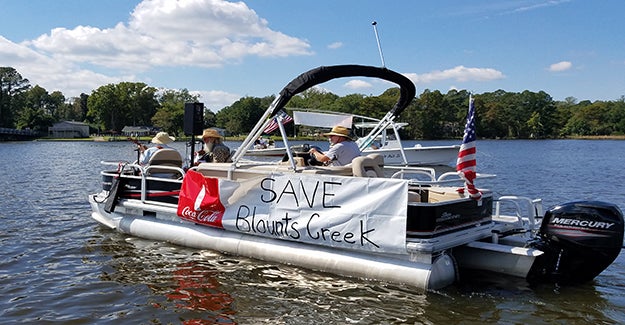Bill could impact water quality, flooding issues
Published 7:48 pm Friday, March 31, 2017

- ON THE CHOPPING BLOCK: Water quality of North Carolina streams and rivers could be negatively impacted by a change in legislation that would allow the destruction of 300 feet of stream bed, of streams flowing year round, without offsetting the destruction elsewhere.
Legislation proposed by state Senate could further erode protections for North Carolina waterways.
Senate Bill 131 would make it possible for developers to destroy up to 300 feet of stream bed without having to offset the loss elsewhere. The current regulation allows for loss of 150 feet without mitigation.
“That’s akin to a football field in length that they can destroy,” said Sound Rivers Deputy Director Heather Deck. “It really is a pretty big change from what we have now and will result in the loss of streams.”
The regulation would apply to streams that flow year round, as opposed to intermittent streams, or those that only flow during rain or flooding events. Mitigation for intermittent streams was eliminated by state legislators in 2015. Deck said 56 percent of stream miles in the state are considered intermittent or headwater streams and are the main source of public drinking water systems.
“We know that protecting these types of headwater streams, even though they don’t have water in them all the time, are extraordinarily important for protecting downstream water quality.”
Deck said the Senate bill, if passed by the House and returned to the Senate for vote, could be devastating to waterways.
“Headwater streams drain between 55 percent and 85 percent of the land area,” Deck wrote in a follow up email. “They account for more than half of the inorganic nitrogen entering our watersheds and provide significant reductions in pollutants such as nutrients and sediment. Many of our lakes and rivers are impaired; we should not be rolling back protections given this fact.”
In addition to hampering water quality, destruction without mitigation could exacerbate flooding, as headwater streams are vital in controlling the flow of water to larger streams and rivers.
“It’s going to impact somebody, because (the water) has to go somewhere. It’s going to flood someone else,” Deck said. “Someone is going to deal with loss of land due to erosion.”
“If you allow this, you will cause more downstream flooding, period. In a timeframe where we’ve just experienced our second 500-year flood in 17 years, this is not what you need to be doing,” she said, referring to 1999’s Hurricane Floyd and Hurricane Matthew in October 2016.
While Sen. Bill Cook has stated the change has the approval of the North Carolina Department of Environmental Quality based on reports, Deck said it does not have the approval of the current DEQ.
She said she has been bolstered by the number of people taking notice of changes being made to environmental regulations.
“I think everyone is in that head, concerned what’s going to happen to our natural resources on a state and national level,” Deck said. “People are really responding to these attacks on our natural resources. Hopefully, our elected officials will listen.”





